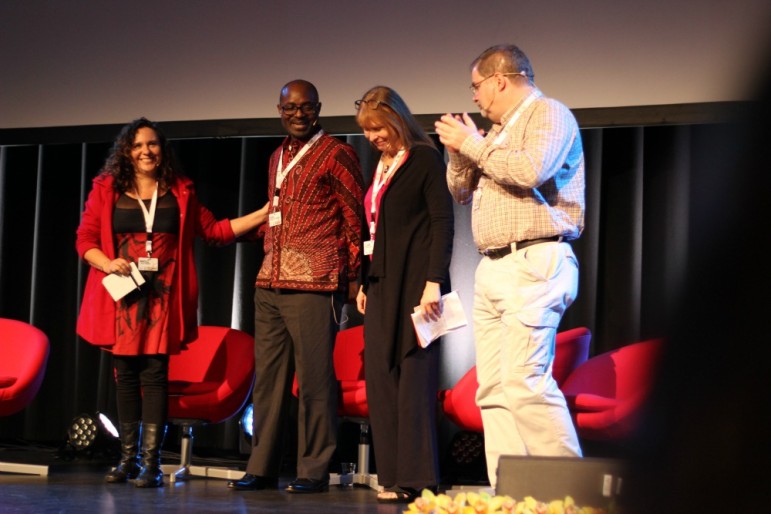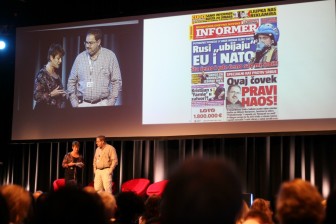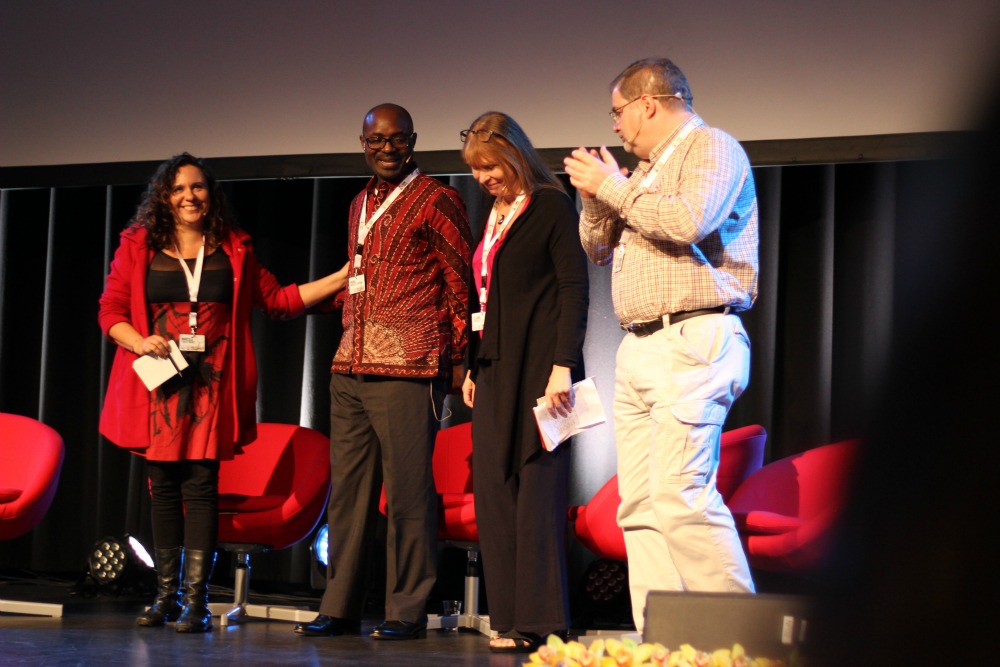
From right to left, Drew Sullivan, Clare Rewcastle Brown, Rafael Marques de Morais and Marcela Turati. Photo: Kristine M. Gutterød.
Forty-four journalists were killed this year. One journalist each week. “Today we will show you that journalism is not a crime”, says Margo Smit, the moderator of the Keynote Panel: Investigative Journalism Under Attack. In this panel, four courageous investigative reporters talked about their experiences with prosecutions, dirty tricks, and violent attacks.
When Margo Smit asks the four investigative journalists on stage what kind of support they need, suggestions like psychological support and physical surveillance are mentioned.
“Be well trained, have education, network, and learn how to protect yourself”, says the Mexican journalist, and editor of Periodistas de a Pie, Marcela Turati. About 100 journalists have been killed, or disappeared in Mexico since the year 2000. “I’d like to create a really strong global network. We need to put pressure on the governments and keep investigating”, says Turati.

Drew Sullivan and Margo Smit. Photo: Kristine M. Gutterød.
Drew Sullivan, editor of Organized Crime and Corruption Reporting Project (OCCRP), highlights social media as a good tool to protect yourself. “You have to know about the tools and how to use them”, says Sullivan. “Use social media! Facebook is very good”.
“How do you keep a brave face?” Margo Smit asks Sullivan. “A big help is the people in this room”, says Sullivan. “Journalists are the protectors for each other. They are our colleagues and our friends.”
Editor of Maka Angola, Rafael Marques de Morais, was the third speaker of this session. He told the GIJC: “One evening in London I was walking outside while it was snowing. There were two flat mates walking in front of me with just their shirts on. No jackets. I said: “Aren’t you freezing?” and they answered it was okay, they were just going to the pub. I tried to be outside without a jacket, but I couldn’t stand it for more than three minutes”, says Rafael Marques de Morais.
He wondered why his flatmates didn’t need a jacket while he was freezing. “They made it because of their inner strength and it is the same with investigative journalism. You need to find your inner strength and figure out what you want to pursue”, says Marques de Morais.
It is important to find a balance between work and life, he says, and make time for the people you care about.
“How do you protect your families?” is the first question from the audience.
“Sometimes I don’t write my name on the articles, and sometimes I wait months before I publish them”, responds Turati.
“It’s a good question. It puts a lot of pressure on your loved ones”, says Clare Rewcastle Brown, founder of the Sarawak Report, who explains that many see journalists as their enemy. “I have cars outside watching me, and people back in Malaysia trying to hack my computer”.
Rewcaster Brown started up Sarawak Report primarily to explore the issues driving the deforestation of the Borneo Rainforest in Malaysia. She also runs Radio Free Sarawak, an independent daily broadcast aimed at serving the indigenous people of the region and to give them a platform on these issues which have affected their lives.
“I want to tell the unwritten stories from this area”, adds Rewcastle Brown who was born and grew up in Malaysia, and wanted to find out what was really going on in the country. Now, by using her computer in her London apartment, she is sharing information about Malaysia with the entire world.
At the end of the session, a Declaration of Journalist Safety was approved by journalists from 120 countries. “We should finish each others’ stories”, concludes Margo Smit. “This work matters. We make a difference.”
Kristine Marie Gutterød and Agnete Bråtun are journalism students at the University College of Volda who are on special assignment covering #gijc15.

